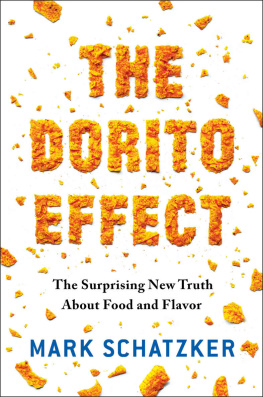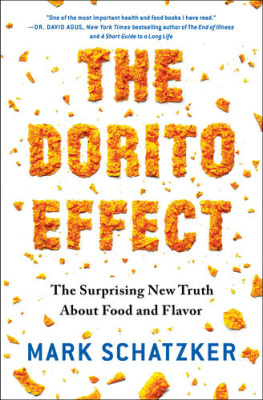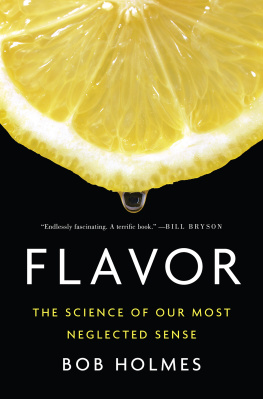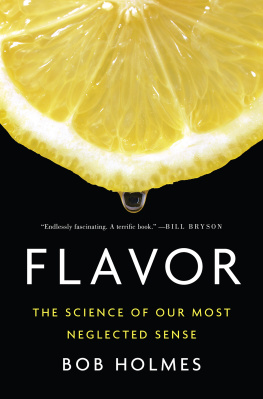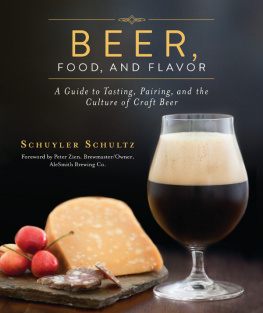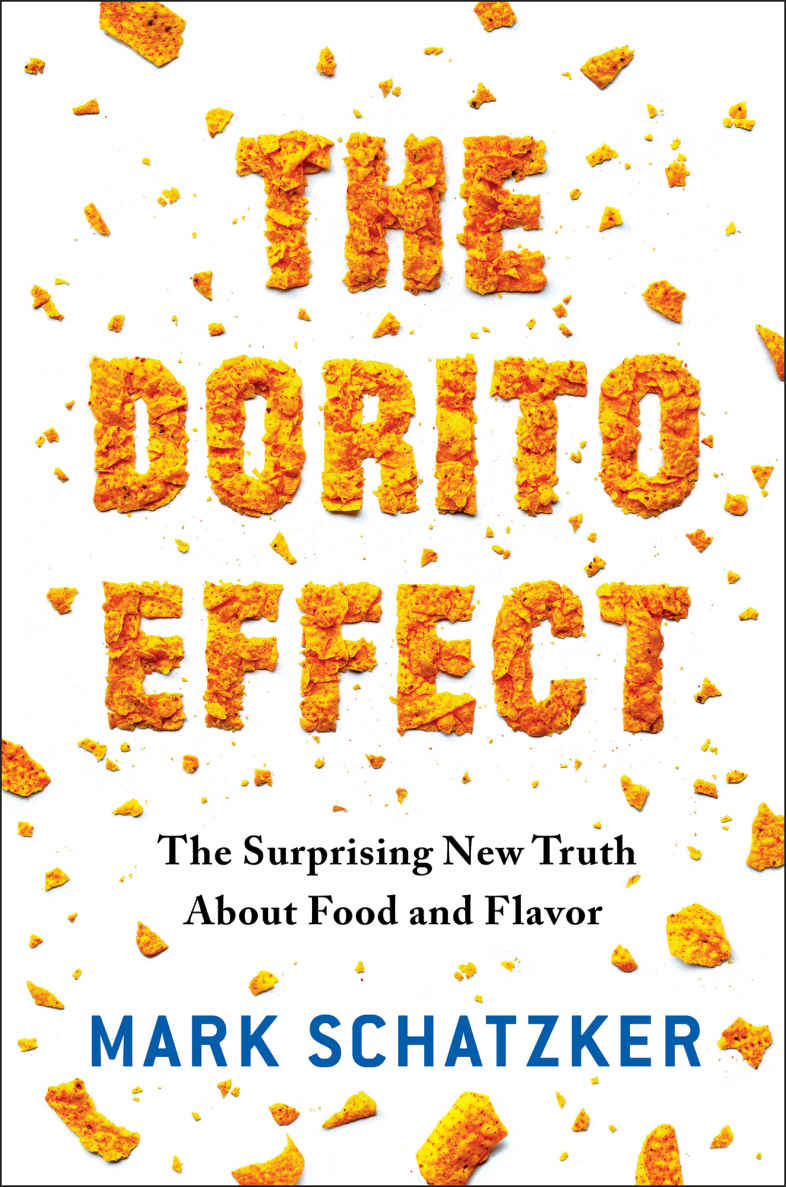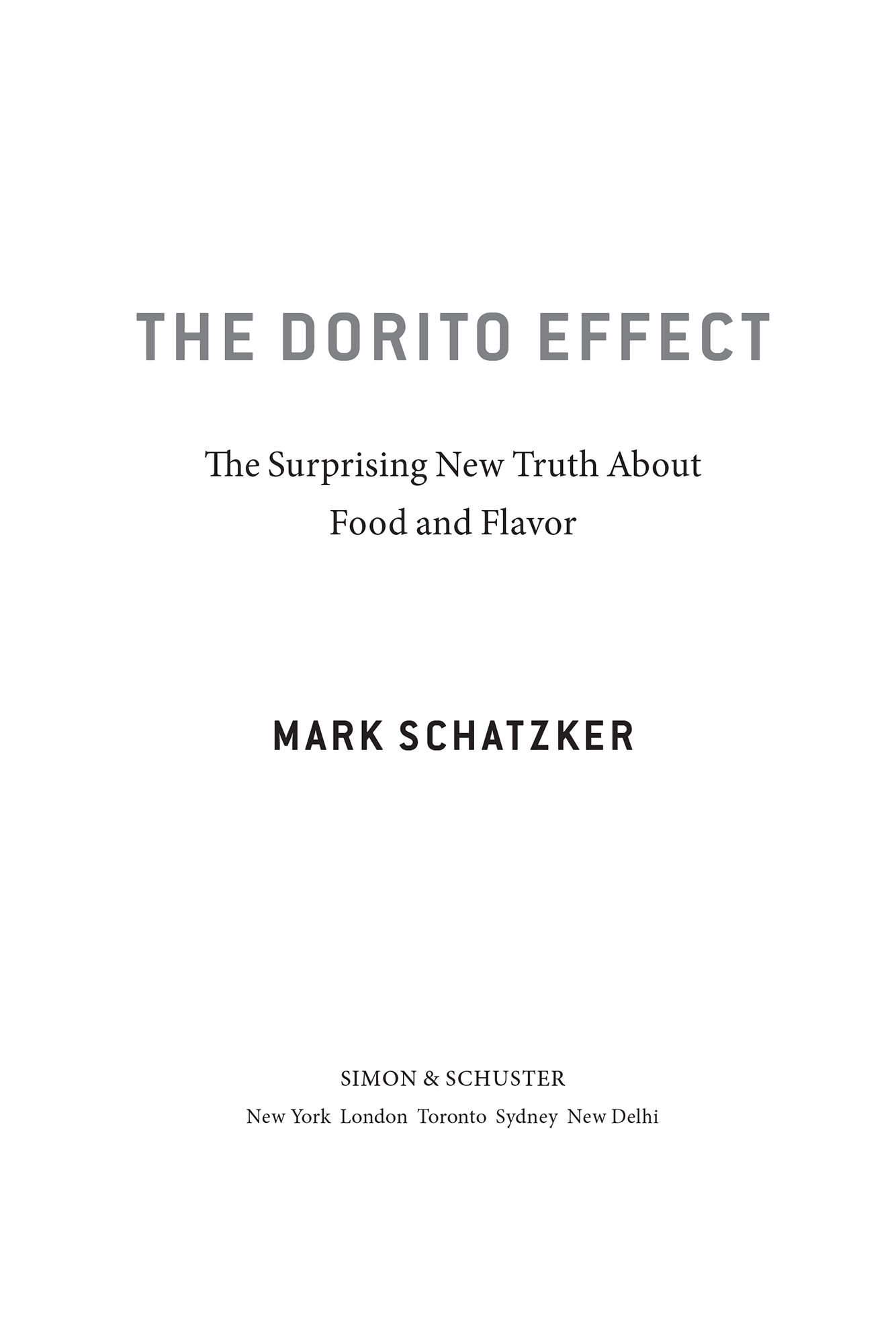Thank you for downloading this Simon & Schuster eBook.
Join our mailing list and get updates on new releases, deals, bonus content and other great books from Simon & Schuster.
C LICK H ERE T O S IGN U P
or visit us online to sign up at
eBookNews.SimonandSchuster.com
Contents
For Laura
junk food noun
1. Pre-prepared or packaged food that has low nutritional value
Oxford English Dictionary
2. Food that is not good for your health because it contains high amounts of fat or sugar
The Merriam-Webster Dictionary
3. Food that tastes like something it is not
Mark Schatzker
PART ONE
THE DORITO EFFECT
ONE
Things and Flavors
I N THE early autumn of 1961, a thirty-seven-year-old housewife and mother named Jean Nidetch was pushing a shopping cart through a Long Island supermarket when she bumped into a woman she knew. You look so marvelous, her friend said, and for a sweet moment Nidetch basked in the compliment. Unfortunately, her friend kept talking. When are you due?
Nidetch was not pregnant. At the time, she stood five seven and weighed 214 pounds, which marked her, in todays parlance, as obese, although Nidetch didnt know what that word meant, or that the obese were, at that very moment, coalescing into a demographic ripple that was on its way to becoming a wave.
Nidetch had been to see diet doctors in New York. When their advice didnt work, she headed across the Hudson River to New Jersey, where the diet doctors proved to be just as useless. She had tried every diet there was, and every one of them worked: She always lost weight. But then she would gain it all backand more. Jean Nidetch could stop eating, just not for very long. She loved food too much. She loved savory things like pizza and meat, and sweet things, too, like cupcakes and soft drinks. Nidetch wasnt one for big breakfasts, but that was because she would get up at three in the morning to gorge on cold pork chops or baked beans right out of the fridge. In summer, if an ice cream, pizza, or sandwich truck zoomed by without stopping, she would take off after it. And when visions of jelly beans began dancing in her head, she would rifle through her sons pockets looking for some. But what Nidetch especially loved were cookies. When she started eating them, she couldnt stop. She was addicted to them.
The day Nidetch was mistaken for pregnant, she phoned the New York City Department of Healths obesity clinic to make an appointment. Not long after, she found herself in a room full of similarly overweight women. An instructor walked in who was so slender that Nidetch decided right there on the spot that after the class she was going to have an ice cream soda. The instructor handed out a sheet of paper with a list of foods the women were allowed to eat. Nidetch saw nothing new. She had whole albums filled with similar diets at home, none of which shed ever been able to follow for very long. But once again, Nidetch tried. She gave up pizza, cake, and ice cream and started eating vegetables and fish. Every week, she went back to the obesity clinic, and every week she lost weighttwo pounds.
It was progress, to Nidetch at least. The slender, ice-cream-soda-inducing instructor thought differently. She looked at Nidetch and said, What are you doing wrong? And as gallingly insensitive, perhaps even abusive, as that might sound, the instructor was right. The truth is Nidetch wasnt following orders, at least not completely. It was the cookies. She was feeding on them in secret. On the way to the clinic, she would sit there on the subway, constructing lies to explain her lack of weight loss, lies that got more and more elaborate with each passing weekIm constipated, Im retaining water, Im premenstrual. By the tenth week, the shame had gotten so bad that she couldnt even look at the instructor.
Nidetch couldnt bear it any longer. She had to get her cookie secret off her chest, so she phoned six fat friends and invited them to her home and confessed. Her friends were supportive. She had a right to eat those cookies, they said. They did stuff like that all the time. One friend hid chocolate chip cookies in the cupboard behind dishes. Another hid snacks behind cans of asparagus where no one would see them. All of them confessed that they, too, got up in the middle of the night to eat. Toward the end of the meeting, something seemingly insignificant happened that would change the course of Nidetchs life. One of her guests said, Jean, can we come back next week? The next week, they brought three more fat friends. The week after that, four additional fat friends joined them.
If this sounds to you like the beginnings of a true-life fairy tale of one woman fighting the odds to attain personal beauty, celebrity, and vast wealth, youre right. Within two months, the weekly meeting had swelled to forty women. A year after the When are you due? question, Nidetch was down to 142 pounds. One night, after one of her increasingly popular meetings, a businessman whod lost 40 pounds thanks to Nidetch suggested she turn her little project into what it so clearly deserved to bea business. She did. Within five years, 297 classes were being held in New York City alone, and there were 25 franchises in 16 states. In 1978, H. J. Heinz, the company that makes the famous ketchup, bought her business for $72 million, making Jean Nidetch the Horatio Alger of weight loss. Youve probably heard of it. You may have even heard this near-mythical story before. Jean Nidetch named her company Weight Watchers.
NIDETCHS SOLUTION to weight loss lay in collective willpower. Weight Watchers wasnt the first diet to push this method. Overeaters Anonymous, which is also based on group support, was founded three years earlier, in 1960.
Group support was just one way people could lose weight. The year after Weight Watchers launched, a high-living photographer put the opposite spin on dieting with The Drinking Mans Diet: How to Lose Weight with a Minimum of Willpower , which sold more than two million copies. It was joined that same year by another liquid solution to trimming down: Diet Pepsi. A few years later, a British biochemist introduced the Cambridge Diet, a tough-love, low-calorie regimen designed to promote fat burning and shed pounds fast.
The pace of diets and dieting was starting to pick up in the 1960s. People were getting fatter. According to the Centers for Disease Control, in the early 1960s, just 13.4 percent of adult Americans qualified as obese. A decade later, the percentage had ticked up more than a full point to 14.5 percent. (The increase during this period is even greater when obesity is measured by skin fold rather than the more simple body mass index calculation.) Obesity really got rolling, however, in the 80s, and by the late 90s, more than 30 percent of American adults were obese, more than double the early 60s tally.
All that dieting, in other words, didnt work. Despite Jean Nidetchs life-changing insight, and the true-life miracles behind every weight-loss regime since, we continue, year after year, to gain weight. In Jean Nidetchs day, obesity was a relatively rare condition. Now its common. Today, obesity is holding at 35 percent, nearly triple what it used to be. By the mid-2000s, the 1961 Jean Nidetch, with a BMI of 33.5squarely in the midrange of obesewould have looked almost normal. Today there is extreme obesity, which hardly existed in the early 60s. Back then, just a tiny slice of Americans met this qualification0.9 percent. The pregnant Nidetch was herself forty-one pounds shy of that mark. Today its at 6.4 percent.

